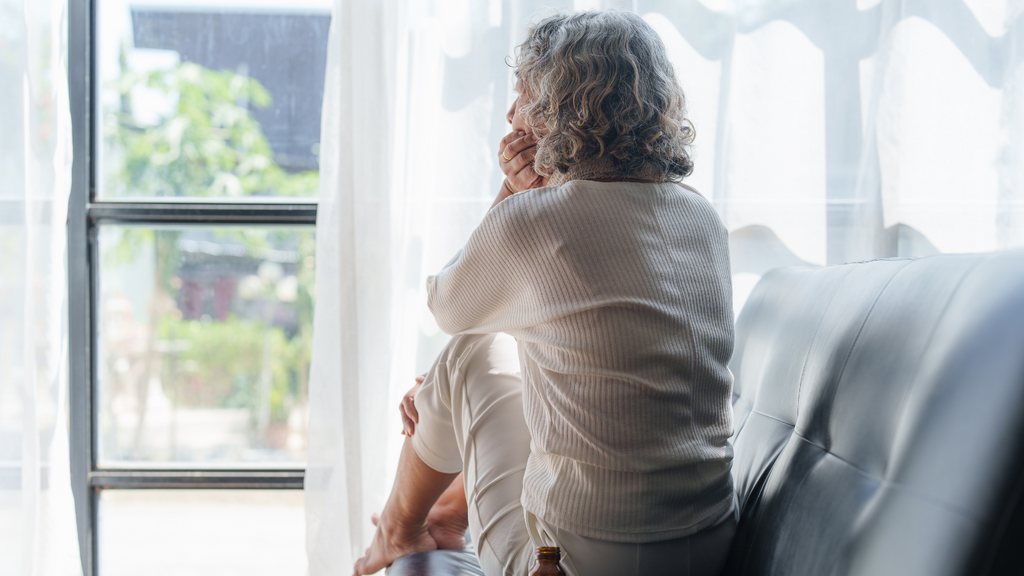
Roles Reversed: It’s Your Turn to Keep Mom and Dad Safe
Roles Reversed: It’s Your Turn to Keep Mom and Dad Safe
As the storm sirens wailed, the power had been out for over an hour, and no one had called to check on her. 78-year-old Margaret, alone, frantically stumbled her way through the dark to search for her nighttime medication, realizing too late she was on her own. She had no idea what to do and could not recognize her apartment in the dark. Starting to worry and afraid of falling, she decided to go without her meds, sat down, and hoped the power would return soon.
During Hurricane Katrina 71% of the victims were older than 60. There is a critical need for emergency preparedness among seniors.
Unfortunately, Margaret's story is all too common among seniors facing unexpected crises. With natural disasters and health emergencies on the rise, ensuring our elderly population is prepared is even more important.
Did you know that only 34% of adults aged 50-80 have prepared an emergency kit with essential supplies and medications?
We all lead busy lives, but there are proactive steps we can take to ensure our independent seniors are safe when we can’t always be close by. Following these guidelines, we can help our senior loved ones stay safe and confident when facing unexpected emergencies.
Home Safety
- Install smoke detectors, carbon monoxide detectors, and fire extinguishers.
- Check these devices regularly and maintain battery changes.
- Ensure walkways stay clear of trip hazards, use only non-slip rugs, and ensure doors and windows are secure.
Falls are a major concern for seniors. Over 14 million or 1 in 4 Americans aged 65+ report falling each year.
Emergency Contact List
Create a list of important phone numbers, including family members, doctors, neighbors, and care providers. Keep copies of this list in easily accessible locations.
- Identify friends, family, and neighbors who can check on and assist your senior during an emergency if you are unable.
- Ensure at least one other person has an extra key, knows where emergency supplies are, and understands how to use lifesaving equipment or administer medicine.
- Store important documents (IDs, insurance policies, medical records, financial information) in a waterproof, portable container in an accessible place. Include contact information for durable medical equipment providers.
Medical Information
- Compile a list of current medications, dosage instructions, allergies, and doctors' contact information.
- Maintain a minimum two-week supply of medications.
- If your senior receives routine treatments at clinics or hospitals, learn about the facility's emergency plans and identify backup service providers.
- Keep extra batteries and supplies for medical devices such as hearing aids, emergency call equipment, oxygen tanks, or mobility aids.
Almost 90% of older adults regularly take at least 1 prescription drug, almost 80% regularly take at least 2 prescription drugs, and 36% regularly take at least 5 different prescription drugs. Maintaining an up-to-date list of medications is crucial in emergency situations.
Emergency Kit
- Prepare a kit with essentials: medication, water, non-perishable food, emergency lighting options, first aid, portable device chargers, common repair tools, and spare batteries. Keep the kit in an accessible location for your senior and update it regularly.
- Place emergency lighting like flashlights in several areas of the home to help with navigation in the dark and to help avoid injuries.
- If your senior lives in a location that sees freezing temperatures, include solutions for warmth.
- If your senior lives in extreme heat, add options to stay cool.
- Include food and water for pets or service animals in the emergency kit.
During the 2021 Texas winter storm, over 55% of those who died were 65 or older, preparation can make all the difference.
Evacuation Planning
- Familiarize seniors with multiple ways to exit their home and leave their neighborhood.
- For seniors with mobility issues, plan how to manage mobility devices during an evacuation.
- Identify the nearest emergency shelters and evacuation routes.
- Plan for evacuation pet care, as not all shelters accept animals. Consider asking out-of-area friends or family to help with pets during emergencies.
Communication Plan
- Establish how family members will contact each other during an emergency.
- Designate an out-of-area contact as a central point of communication, as local lines may be congested during a crisis.
Stay Informed
- Keep a battery-powered or hand-crank radio for emergency updates.
- Sign up for local alert systems and emergency notification apps to stay informed.
Timely information can be life-saving. 80% of the estimated 12,000 people in the United States who die of heat-related causes annually are over age 60. Seniors are more likely to be hospitalized for heat-related illness than the general population. Staying updated on weather conditions and other emergencies is critical for seniors.
Practice the Plan
- Regularly review and practice the emergency plan with your senior and their support network.
- Update the plan as necessary to reflect any changes in health or living situation.
Remember, the average emergency response time to 911 calls is 10-15 minutes, but for seniors living alone, it can be significantly longer if they're unable to reach a phone.
Tags
- All
- 25 year food
- 25 year shelf life food
- 72 hour kit
- Best food storage types
- Best long-term food storage
- Blizzard preparedness
- Budgeting
- canning
- Certified GMO-free Emergency foods
- Certified GMO-free foods
- Coffee
- Comparison of emergency food methods
- Composting tips
- Dangers of genetically modified foods
- dehydrated food
- Edible Wild Plants
- emergcy preparedness
- Emergency Cooking
- Emergency Food
- Emergency food Christmas gifts
- emergency food storage
- Emergency Food Supply
- Emergency food supply recommendations
- Emergency Planning
- Emergency Preparedness
- Emergency preparedness advice
- emergency preparednesss
- Emergency Supplies
- Emergency supplies checklist
- Emergency Survival
- emergency survival gear
- Emergency survival kit checklist
- Emergency Survival skills
- exercise
- Family emergency preparedness
- Family emergency preparedness plan
- Family Preparedness
- Food Storage
- Food storage 25 year shelf life
- Food storage amounts
- Food storage Christmas
- Food storage containers long term
- Food Storage Secrets
- Food storage serving size
- Food storage types compared
- freeze dried food
- Freeze dried food storage
- freeze dried meats
- Freeze-dried emergency food storage
- Fruit Trees
- Gardening
- Getting Started
- Gluten-free food Storage
- Gourmet emergency food
- Healthy food storage
- How much emergency food to store
- Improved emergency preparedness
- Jared Markin
- Jared Matkin
- Legacy Premium
- Lessons learned from Hurricane Sandy
- Lessons learned from natural disasters
- long-term food storage
- Long-term Food Storage Guidelines
- Long-term Food Storage tips
- Long-term water storage
- Mental Emergency Preparedness
- Mental toughness
- Money-saving tips
- Natural disaster planning
- Natural Disasters
- Perfect Christmas gifts
- Pet Emergency preparedness checklist
- Pet Emergency preparedness kit
- Pet Emergency Survival tips
- Pets and Emergency Preparedness
- Plant Foraging
- portable solar panels
- portable solar power
- portable water filters
- protein drinks
- Risk of genetic modification
- Seed saving and storage
- Seed saving guide
- Self-reliance
- Self-reliant practices
- Shelf Life
- Solar Cooking
- Solar Ovens
- Special Dietary needs
- Stranded in a car in a blizzard
- Survival food
- Survival Gear
- survival kit
- Survival kits
- Survival Ovens
- Survival Skills
- survivalist gear
- suvival kit
- Tree Pruning tips
- Tree Trimming basics
- unique ideas
- water bottle with filter
- water filter
- water filter straw
- water filters
- Water Filtration
- water pitcher with filter
- water pitchers with filters
- Water purification
- Wild Food Foraging
- Winter composting
- Winter driving
- Winter preparedness tips
- Winter storm preparedness tips
- Winter Survival







